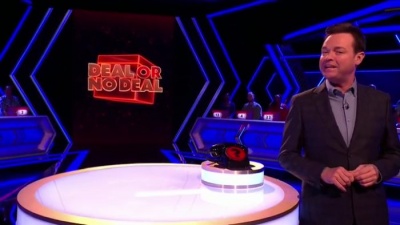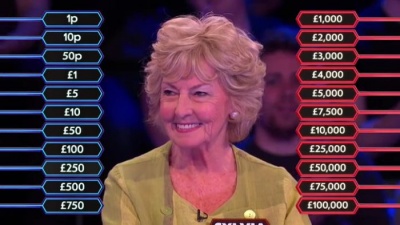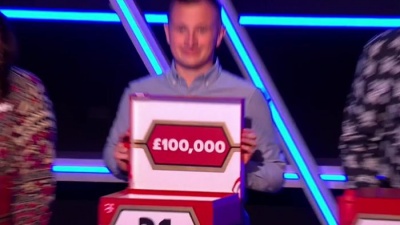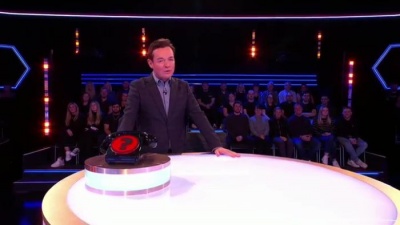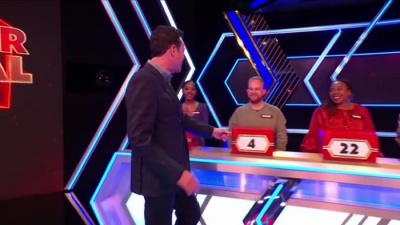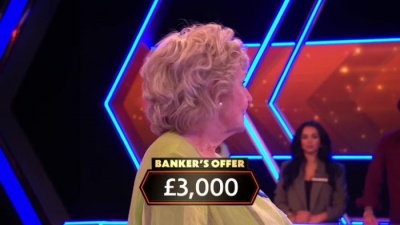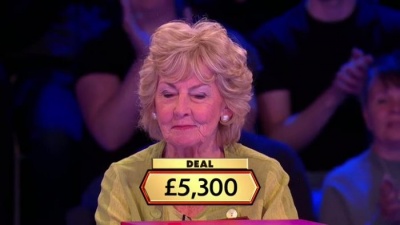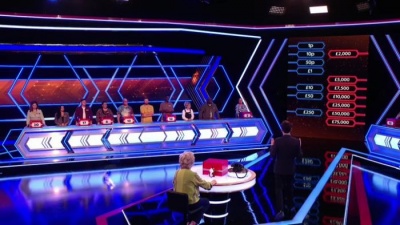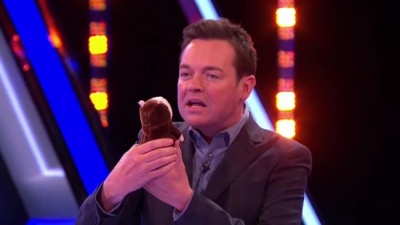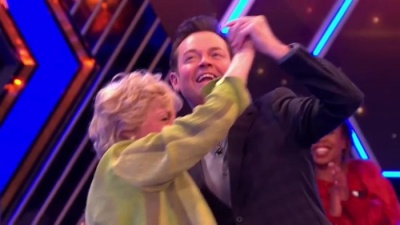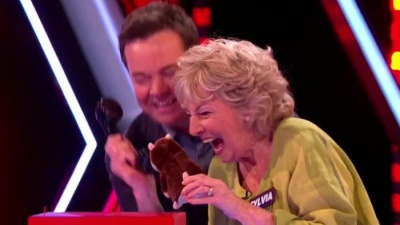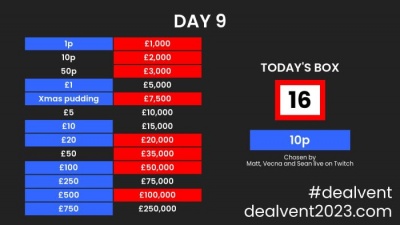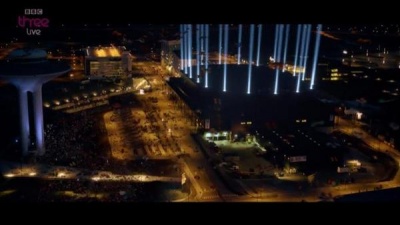Weaver's Week 2023-12-10
(Created page with 'Last week | Weaver's Week Index | Next week <div class=square style="float:right;clear:right;"> [[Fil…')
Newer edit →
Revision as of 10:01, 10 December 2023
Last week | Weaver's Week Index | Next week
Scenes on University Challenge as one of the teams absolutely loses it during the music round. Who would have thought that they'd play extreme rock band Napalm Death on primetime BBC2?
Contents |
Deal or No Deal
Remarkable Television (a Banijay company) for ITV, from 20 November
We've had a letter, from Geoff in Nottingham. He writes,
- Dear TV Times,
- It's great to see the return of Deal or No Deal on ITV. Stephen Mulhern is the perfect host for the game show, which was previously on C4. The first episode couldn't have been more nailbiting and I know the jackpot prize may not be as much as before, but £100,000 is still a lot of money in my book!
Well, that just about completes our review... oh, go on then.
Twenty-two sealed boxes. A tenth of a million pounds. And no questions, except one. Who is this clean-shaven host?
Stephen Mulhern has been a mainstay of ITV for the entire century. From his primetime hit In for a Penny, and gadding about on Saturday Night Takeaway, Stephen has cornered the market in dippy and good-natured joshing. To an extent, this is a character he puts on – we saw on Magic Numbers and Pick Me! that Stephen is as sharp as a knife. He can explain some complex rules in a very understandable and entertaining way. Please take notes, Alan Carr.
As for Deal or No Deal, it is a very simple game. A player picks a box at random, containing an amount from one new penny to £100,000. At the end of the game, they will get what's in the box – if they still own it.
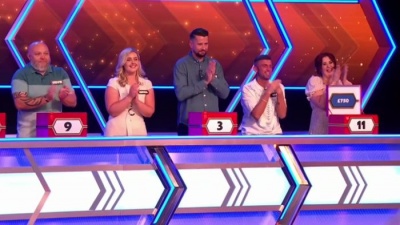 There's £750 in the opened box, so it cannot be in the contestant's box. This is generally a good thing.
There's £750 in the opened box, so it cannot be in the contestant's box. This is generally a good thing.
Around the studio are twenty-one similar boxes, each containing one of the amounts from one new penny to £100,000. Each amount appears in one box only. The player calls for the other boxes to be opened, revealing an amount which isn't in their own box. For instance, if you see £1000 on the wings, you know £1000 isn't in your box.
From time to time, "The Banker" calls down to the studio, and makes an offer for the box. The quandary: will the player sell their box for the amount offered? Or will they push on and hope the box contains more – or a later offer will be for more? The show's name comes from this decision: does the player say "deal", or "no deal"?
Deal or No Deal ran on Channel 4 for a decade earlier in the century. Hosted by the bearded wonder Noel Edmonds, the show was a breath of fresh air when it began, but became wallpaper telly by being on every day for years. Noel had a propensity to make the show more complex, and relied on its accreted history; his style ensured Deal or No Deal became impenetrable for casual viewers. Deal or No Deal came off air at Christmas 2016, and nobody seemed too upset.
Seven years later, we have some new episodes. What's changed, what's stayed the same?
Biggest change is to the top end of the board. The original top prize was £250,000, a quarter of a million pounds. This was a tremendous amount of money, something like eleven years' income for the average household. It's money to retire early, or buy a nice house, or put the grandkids through school. The second and third prizes – £100,000 and £75,000 – still represented many years' income.
Nowadays, the top prize is £100,000. This is still a very decent wodge of cash, about three years' income for the average household. It's an extra pension, or the deposit on a nice house, or put a grandkid through university. But it's not such obviously life-changing money. Noel Edmonds described his show as "the dream factory"; Stephen's programme is more of a hope foundry.
By cutting the top prize, ITV have altered the game. It's no longer a game where a life can be changed beyond measure every single day; rather, it's a challenge of very useful money. We don't wish to knock the prizes – goodness knows, there are plenty of people for whom £2500 will provide much-needed breathing room, including this column at times in our life – but the top-end dreams cannot be fulfilled. Sometimes, the Lottery is described as a £1 license to dream of transformation, and Deal or No Deal doesn't offer that any more.
What Deal or No Deal does offer is a different host. Noel Edmonds had a lot of experience when he came to Deal or No Deal; thirty years of experience across television and radio. He also brought a lot of baggage, the humiliating end of Noel's House Party, the tragic conclusion of his Late Late Breakfast Show, and he'd been politically active in the prior few years. (For further details, we wrote a three-part profile of Noel Edmonds in 2020.) Stephen Mulhern has a lot of experience, he's been on ITV since the turn of the century. But he doesn't have anything like the baggage – if viewers know him, we associate him with Catchphrase and that silly show where he gets the public to do daft things for tiny prizes.
Stephen Mulhern brings his tremendous talents to the programme. Throughout his career, Stephen has been great with people. He helps them bring out their personalities, helps them tell their stories, and weigh up their options in the game. He's cheeky, he's chatty, he's as positive as he can be – but always reflecting the studio's mood. And because Stephen has built his career on being so guileless, so innocent, it doesn't feel as though he's promoting some other agenda. Unlike the previous host, he comes across as an honest broker. We get what we see with Stephen.
The gameplay is similar to the previous version – one from twenty-two players is selected, and brings their box up to the table. Our player opens five boxes, then hears the first offer. Three more boxes, another offer. Three boxes, offer, three boxes, offer, three boxes, offer. By now, five boxes remain, and the player needs open just two more before hearing the next offer. This offer with three boxes remaining is new for the ITV series. Reject that, they'll open one more box and consider the final offer. Reject that and the player wins whatever's in their box.
At the heart of Deal or No Deal is the decision, to deal and sell your box, or to play on and hope it contains something good. Our friend Brig Bother noted that the offers are very predictable.
17-box: about £1,000
14-box: about £2,500
11-box: about £4,000
8-box: about £6,000
5-box: about 18% of the top box
3-box: about 80% about the mean
2-box: about 90% the mean, unless the final boxes are rubbish (or not in live play) than slightly above the mean.
You might get a bit lower if you knock out two big reds in a round. But even then it might go up anyway.
We vaguely recall that the Channel 4 banker took a few months to move out of a similar comfort zone, and start to play a psychological game with the players. We're reviewing the ITV show after three weeks, and even given his previous experience, The Banker could use this series as a warm-up to get his eye in before more shows next year.
Yes, The Banker is still there. The Scrooge-like figure who will pay out money if he absolutely has to, and doesn't want to pay a cent more than he must. If he can buy a box worth £50,000 for £9500, The Banker will be happy. But will the contestant sell at that price; would £10,200 tip the balance in his favour? The Banker's dilemma is to pitch the offers so that the contestant will deal, particularly with one of the three last offers.
As before, if the player deals before the final offer, they continue to open boxes, and The Banker pretends that he would have made a particular offer. This has never felt authentic, and has always come across as a way for the producers to warn other contestants against early deals.
Other elements have come back. Augustin Bousfield's music – the themes, the boom as boxes are opened, the thinking tune; there's no need to change a winning formula. The studio set is familiar, long desks in a V shape, the contestant table is at the top of the V. The viewers' call-and-lose competition is back, except it's now a gratis visit-the-website-fill-in-a-form-and-lose competition. Running jokes and themes emerge, as a contestant says something and it's picked up by host and banker; some of these themes run day after day. Some tortured links into the break, it wouldn't be Deal or No Deal without some groansome puns.
We came into this review with three questions about Deal or No Deal.
1) Is Stephen Mulhern at least as good as Noel Edmonds? Yes, yes he is. Stephen is different from Noel, and plays more to his personal strengths. This won't appeal to any hardcore Edmondsonians out there, but we don't know that there are many people who love Noel and hate Stephen because he's not Noel.
Even when a contestant takes a decent deal too early – takes £9500 when there's £46,000 in the game – he doesn't make it feel like a loss. "You've got what you came for, that will be a great help in your life!" and "It could have gone the other way". There is no guilt about not wringing every last penny from The Banker. Deal or No Deal has become a celebration where it can be, and this positivity is right for the current day.
2) They've cut the prizes down, but can the Hope Foundry still make compelling television? Yes, it can. A finish of £25k, £10k, £5k, £2k, and 10p gives an offer of £5600; is that enough to make you deal? Is that enough for the bloke on telly, the bloke you've been watching and supporting for the past 45 minutes? At three-box: £10k, £2k, 10p, with an offer of £3100. That's a proper decision, we can respect a deal or a no deal. On the old board, that would have been £50k, £20k, £10k, £2k, 10p, and an offer of £15,000; then £7000 on 20k, 2k, 10p. Both are clearcut "no deal" decisions.
3) What chance of another series? ITV may already have signed on the dotted line, the initial ratings are about 1.8 million in the 4pm hour. That's at or above Tipping Point, which has run at 4pm almost continuously since the start of 2013.
ITV is in the luxurious position of having lots of daytime successes. Lingo, Riddiculous, Tenable at 3pm. Deal or No Deal joins Tipping Point at 4pm. The Chase holds down 5pm, in winter the biggest quiz on television. This column reckons more Deal or No Deal is inevitable, but it won't run all year round like on Channel 4. And this is the best result for everyone – the viewer gets another choice of viewing, the broadcaster can eke out successful formats and freshen up the schedule.
BBC Brain
The 2023 final was broadcast this week. The contestants were:
- Dan Adler, a computer plumber from Farnham
- Eleanor Ayres, a solicitor from Cambridgeshire
- Colin Kidd, an accountant from Bushey in Hertfordshire
- George Scratcherd, an insight analyst from Barking
Dan Adler gets the first question, about short-lived prime minister George Canning. He's set for five in a row but bumps up against a stinker of a ballet pose. How to Train Your Dragon crops up in Eleanor Ayres' set, but she's defeated from five by the idea that Andrew Lloyd Webber would compose music for a public occasion. Colin Kidd is asked how many million calls are made from public phone boxes – five million a year, apparently. That bonus goes to bonus king George Scratcherd, and gets stumped by a chemistry law. At the end of the round, the scores are 4-4, 4-4.
An unorthodox version of the song "Right said Fred" – by Maya Angelou and Jessica Mitford – stumps Dan and the whole panel. "I've never heard that before!" exclaims host Russell Davies; we almost wish we hadn't. It's from the 1998 album Stranger than Fiction, where writers perform their favourite songs and raise money for literacy charities. We all know that Samuel Pepys buried cheese in his garden, but Colin remembers it was Parmesan cheese. Ava Gardner's taste in husbands gives Dan a bonus, and the scores are 6-6, 6-5.
The acting works of Viola Davies and the history of Dennis the Menace help Dan in the next round, only to be beaten by poetic names for October. In a "name the year" question, Eleanor is precisely right, so Ken Bruce will have to go back in his box. Colin scores well on his set, but yields a bonus for Dan on the Domesday Clock. With George missing his opener on DDT, we have a clear leader – Dan 10, Colin 9, Eleanor 8, George 5.
Such is the quality of play that we only have time for four rounds this week. It may be "Manifest destiny", that's one of the marks for Dan in a run of four. Eleanor has a run of three, but is beaten by players who scored for both sides in an FA Cup final. Colin is not floored by a version of "Knock on wood" by Smokin' Joe Frazier and the Knockouts, but he is beaten by the melisma beloved of Mariah Carey.
The final scores – George 8, Colin 11, Eleanor 11, Dan 15. So Dan Adler becomes the 69th name on the BBC Brain trophy, and books his seat in Brain of Brains next year.
In other news
Advent calendars Dealvent is a game of Deal or No Deal played out over social media, run by Dan Peake and Brig Bother. Would you sell Box 13 for a used copy of The Best of Des O'Connor Volume 2, half a house brick and a milk bottle? More at dealvent2023.com.
Dan also runs Puzzlevent, a cryptic crossword with clues drip-fed to you; one lucky winner will win a copy of Dan's new puzzle book "The Ordnance Survey Puzzle Book: Legends And Landmarks" Both games run all the way to Christmas, and a bit beyond.
Eurovision countup Thirty-seven broadcasters are on the slate for next year's senior contest. RTL represent Luxembourg for the first time since 1993, and RTBF return after a one-year absence to take the tag "Belgium", replacing VRT. SBS from Australia will continue to send a song, following renewal of their agreement with the EBU. TVR from Romania are still in talks about whether they take part, and they would be entry number 38. There's no space for MKRTV from North Macedonia, who did well at Junior Eurovision; and BRT from Bulgaria seem to be out permanently. The contest takes place in Malmö next May; be there or watch it on telly.
The TV Times is still published, and its readers vote in the annual TV Times awards. Winners in our sphere are Strictly Come Dancing (favourite entertainment show), Ant and Dec (favourite presenter), and the late Paul O'Grady had a special award. Eastenders and Happy Valley were the other big winners.
RTS Craft and Design Awards were handed out this week. Winners amongst game and competition shows were Tim Routledge, James Scott, and Morgan Evans from the Eurovision Song Contest – they won the Lighting for Multicamera award. The entire Eurovision Song Contest production management team won in Production Management, because there were absolutely no goofs or flubs or errors during the week. Mathieu Weekes and Bizibot Productions won Production Design for The Traitors, the judges were blown away by the incredible attention to detail right across the production.
Quizzy Mondays
Chris McCausland made his debut on House of Games this week. Because Chris is blind, they had some unusual changes – no visual rounds, Richard read questions off cue cards. Answer Smash was to merge trivia answers with songs, so we considered the Wombles of Wimbledon Common People.
A perfect round on Mastermind is rare. Graeme Barton delivered one on the racing driver Nigel Mansell, and opened up a five point lead on all other contestants. But, with the inevitability of a Murray Walker prediction going wrong, Graeme was pipped to the win by Sharon Chambers – she'd underperformed on The League of Gentlemen, but raced away with general knowledge to win by a single mark.
Winding back to last Friday, when they had to have a tie-break on Celebrity Mastermind. Just three questions, befitting the shorter and simpler contest.
"Water wall's been very popular this year," said Victoria on Only Connect. Truth accepted: Lion was picked first in 7 of the first 12 episodes, and hasn't been chosen first in the nine episodes since. Not that this has much bearing on the game, where the result was a 17-17 draw between the Suncatchers and Gunners. As we're in the quarter-finals, the questions were hard, and the teams didn't score much in the Sequences round – the worst sea states, The Usual Suspects poster, and shapes of coins all slipped through their fingers like soap in the shower. Question of the night: put "Pro" and "Con" in front of a word for two different meanings.
What, Only Connect is a knockout quiz and cannot accept a tie? Suncatchers take the captain's tiebreak, and we'll see them next year in the semi-final.
University Challenge is a buzzer quiz, and Manchester beat Edinburgh on the buzzers, and by 215-105 on the scoreboard. The team that everyone wants to beat got off to a strong start, continued strongly, and finished by buzzing in a lot. When Edinburgh did get in, they made progress, but were clearly second best in this match. We should note that this was the first match contested entirely by blokes in a couple of years.
Quiz digest
Remember these facts, they might help win bored games, or impress someone over the dinner table.
- Joseph Heller published Catch-22 as Catch-18, but changed it to avoid confusion with the book "Mila 18" by Leon Uris. They then thought of Catch-11, but changed that to avoid confusion with Frank Sinatra's film Ocean's 11. Heller also suggested Catch-14, but that didn't sound at all fun.
- A "foible" is a personal habit or weakness. It takes its name from the pointy end of a fencing foil sword, and has the same root as "feeble". The opposite is the "forte" of a sword, or someone's personal strong point. (BBC Brain)
- "Cli-fi" is a new area of speculative fiction, discussing how climate change caused by global heating might alter life on Earth. (University Challenge)
- Bonnie Langford played Violet Elizabeth in the television adaptation of Just William then Doctor Who companion Mel in the late 1980s.
- The Credito Emiliano bank accepts wheels of Parmiganio-Reggiano cheese as collateral against loans. The bank operates in the region where they produce real Parmesan cheeses, and a full wheel may sell for €1500 or more. It buys the cheese from farmers for €1000 or so, then lets the cheese mature in a sophisticated warehouse for a year or two until it is ready to be eaten. (House of Games)
Another week, another final: Mamma Mia! I Have a Dream (ITV, Sun) asks the public to choose between identikit finalists. We'll review the show next week. There's a new run of Counterpoint (Radio 4, Mon), and a mid-Advent edition of A League of Their Own (The Satellite Channel, Wed). Next Saturday has the Strictly Come Dancing final (BBC1) and the Survivor final (BBC1).
Pictures: Remarkable Television, Daniel Peake, EBU / SVT, Studio Lambert Scotland
To have Weaver's Week emailed to you on publication day, receive our exclusive TV roundup of the game shows in the week ahead, and chat to other ukgameshows.com readers, sign up to our Google Group.


